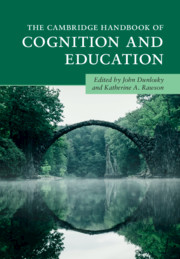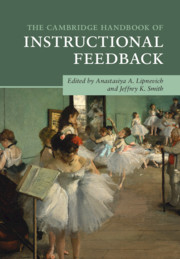The Cambridge Handbook of Cognition and Education
Part of Cambridge Handbooks in Psychology
- Editors:
- John Dunlosky, Kent State University, Ohio
- Katherine A. Rawson, Kent State University, Ohio
- Date Published: June 2019
- availability: Available
- format: Hardback
- isbn: 9781108416016
Hardback
Other available formats:
eBook
Looking for an inspection copy?
This title is not currently available for inspection. However, if you are interested in the title for your course we can consider offering an inspection copy. To register your interest please contact [email protected] providing details of the course you are teaching.
-
This Handbook reviews a wealth of research in cognitive and educational psychology that investigates how to enhance learning and instruction to aid students struggling to learn and to advise teachers on how best to support student learning. The Handbook includes features that inform readers about how to improve instruction and student achievement based on scientific evidence across different domains, including science, mathematics, reading and writing. Each chapter supplies a description of the learning goal, a balanced presentation of the current evidence about the efficacy of various approaches to obtaining that learning goal, and a discussion of important future directions for research in this area. It is the ideal resource for researchers continuing their study of this field or for those only now beginning to explore how to improve student achievement.
Read more- Showcases the strength of evidence on how to improve various aspects of education
- Each chapter offers ideas on where each field should go next so as to inform education practices
- Supplies an overview of the origins of each field and where it will be moving in the future
- Scientists, instructors, and students will find the chapters accessible, easy to read, and informative
Reviews & endorsements
'What does cognitive psychology have to offer for those who want to make instruction and education more effective? This Handbook provides expert and up-to-date analyses of the many strands in this complex interdisciplinary field. Edited by two of the most dynamic and respected researchers working in the area, the Handbook should be very useful for those working in this burgeoning field and for those hoping to join the field.' Hal Pashler, University of California, San Diego
See more reviews'Cognitive factors are critical in determining the effectiveness of our teaching. With a stellar cast of researchers within its pages, The Cambridge Handbook of Cognition and Education edited by Dunlosky and Rawson, two leaders in our field, provides comprehensive coverage. This Handbook will remain current for many years. It deserves pride of place in any library committed to educational excellence.' John Sweller, Emeritus Professor of Educational Psychology, University of New South Wales, Australia
'This volume imparts a magnificent overview of current research on many topics bridging between cognitive psychology and education. The chapters provide authoritative summaries of central issues written by leaders in the field. The book will be of great interest to researchers and educators - and should be widely read.' Henry L. Roediger, III, James S. McDonnell Distinguished University Professor, Washington University, St Louis
Customer reviews
Not yet reviewed
Be the first to review
Review was not posted due to profanity
×Product details
- Date Published: June 2019
- format: Hardback
- isbn: 9781108416016
- length: 748 pages
- dimensions: 262 x 184 x 43 mm
- weight: 1.5kg
- contains: 79 b/w illus. 31 tables
- availability: Available
Table of Contents
How cognitive psychology can inform evidence-based education reform: an overview of The Cambridge Handbook of Cognition and Education John Dunlosky and Katherine A. Rawson
Part I. Foundations:
1. How the learning sciences can inform cognitive psychology Keith Sawyer and John Dunlosky
2. Quackery in educational research Daniel H. Robinson and Joel R. Levin
Part II. Science and Math:
3. Teaching critical thinking as if our future depends on it, because it does Diane F. Halpern and Heather A. Butler
4. Improving students' scientific thinking David Klahr, Corinne Zimmerman and Bryan J. Matlen
5. Spatial skills, reasoning, and mathematics Nora S. Newcombe, Julie L. Booth and Elizabeth Gunderson
6. Iterative development of conceptual and procedural knowledge in mathematics learning and instruction Bethany Rittle-Johnson
7. Development of fraction understanding Pooja G. Sidney, Clarissa A. Thompson and John E. Opfer
8. Learning how to solve problems by studying examples Tamara van Gog, Nikol Rummel and Alexander Renkl
9. Harnessing our hands to teach mathematics: how gesture can be used as a teaching tool in the classroom Elizabeth M. Wakefield and Susan Goldin-Meadow
Part III. Reading and Writing:
10. Fundamental components of reading comprehension Anne E. Cook and Edward J. O'Brien
11. Writing as a learning activity Perry D. Klein and Aartje van Dijk
12. Bilingualism and education: connecting cognitive science research to language learning Gigi Luk and Judith F. Kroll
13. Note-taking Stephen T. Peverly and Amie D. Wolf
14. Multiple text comprehension Jean-François Rouet, M. Anne Britt and Anna Potocki
15. Interventions to promote reading for understanding: current evidence and future directions Elizabeth A. Stevens and Sharon Vaughn
Part IV. General Learning Strategies:
16. When does interleaving practice improve learning? Paulo F. Carvalho and Robert L. Goldstone
17. Correcting student errors and misconceptions Elizabeth J. Marsh and Emmaline E. Drew
18. How multimedia can improve learning and instruction Richard E. Mayer
19. Multiple-choice and short-answer quizzing on equal footing in the classroom: potential indirect effects of testing Mark A. McDaniel and Jeri L. Little
20. Collaborative learning: the benefits and costs Timothy J. Nokes-Malach, Cristina D. Zepeda, Elizabeth Richey and Soniya Gadgil
21. Self-explaining: learning about principles and their application Alexander Renkl and Alexander Eitel
22. Enhancing the quality of student learning using distributed practice Melody Wiseheart, Carolina E. Küpper-Tetzel, Tina Weston, Alice S. N. Kim, Irina V. Kapler and Vanessa Foot
Part V. Metacognition:
23. Self-regulation in computer-assisted learning systems Roger Azevedo, Nicholas V. Mudrick, Michelle Taub and Amanda E. Bradbury
24. Improving students' metacomprehension accuracy Thomas D. Griffin, Marta K. Mielicki and Jennifer Wiley
25. Calibration and self-regulated learning: making the connections Douglas J. Hacker and Linda Bol
26. Teachers' judgments of student learning of mathematics Keith W. Thiede, Steven Oswalt, Jonathan L. Brendefur, Michele B. Carney and Richard D. Osguthorpe
27. Learning strategies and self-regulated learning Philip H. Winne and Zahia Marzouk.
Sorry, this resource is locked
Please register or sign in to request access. If you are having problems accessing these resources please email [email protected]
Register Sign in» Proceed
You are now leaving the Cambridge University Press website. Your eBook purchase and download will be completed by our partner www.ebooks.com. Please see the permission section of the www.ebooks.com catalogue page for details of the print & copy limits on our eBooks.
Continue ×Are you sure you want to delete your account?
This cannot be undone.
Thank you for your feedback which will help us improve our service.
If you requested a response, we will make sure to get back to you shortly.
×


